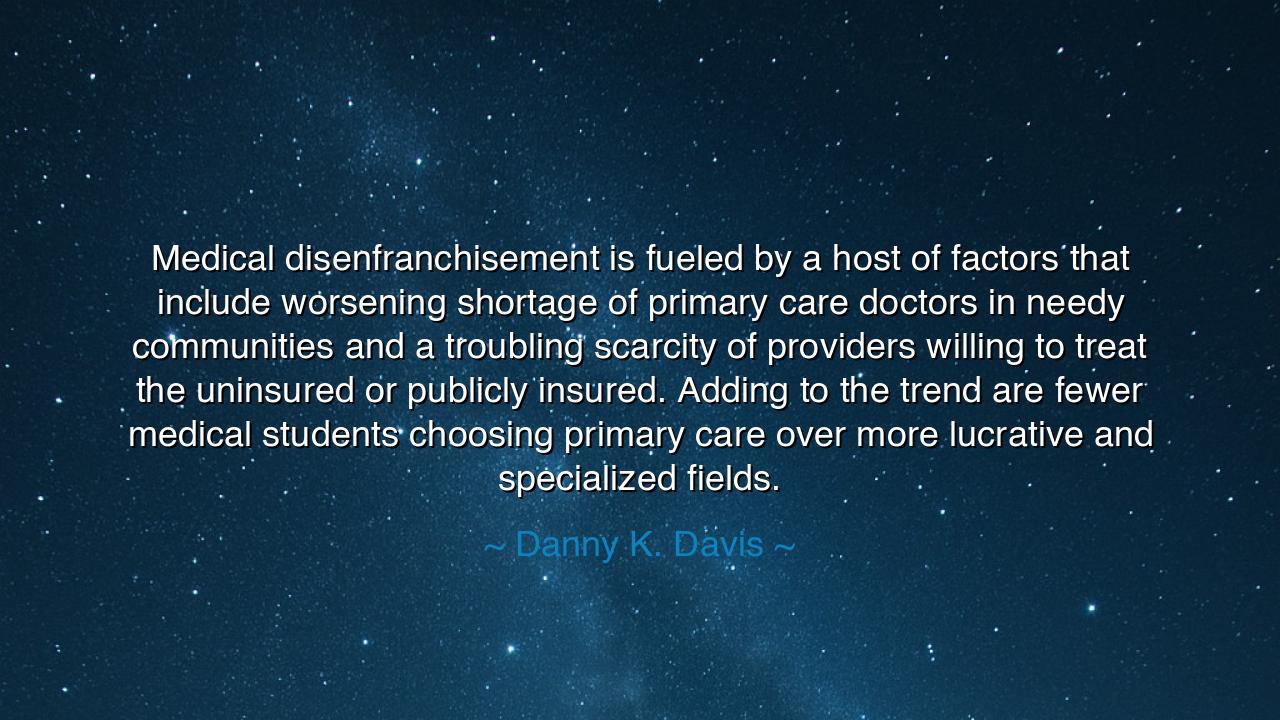
Medical disenfranchisement is fueled by a host of factors that
Medical disenfranchisement is fueled by a host of factors that include worsening shortage of primary care doctors in needy communities and a troubling scarcity of providers willing to treat the uninsured or publicly insured. Adding to the trend are fewer medical students choosing primary care over more lucrative and specialized fields.






Hear now the words of Danny K. Davis, spoken with urgency for the sick and forgotten: “Medical disenfranchisement is fueled by a host of factors that include worsening shortage of primary care doctors in needy communities and a troubling scarcity of providers willing to treat the uninsured or publicly insured. Adding to the trend are fewer medical students choosing primary care over more lucrative and specialized fields.” In this utterance lies both lament and prophecy. He names medical disenfranchisement, the great injustice of our age, where the poor and vulnerable are denied access not by walls of stone, but by absence—absence of doctors, absence of care, absence of compassion.
This truth has its roots in history. For generations, physicians have been revered as servants of life, yet their presence has rarely been spread equally. In wealthy centers, hospitals rise tall and gleaming, yet in rural villages and impoverished neighborhoods, clinics stand empty, waiting for healers who do not come. Davis names the shortage of primary care doctors, the absence of those who are meant to be the first guardians of health, who watch over the common ailments before they grow into calamities. Without them, preventable illness festers, and the poor are left to suffer in silence.
He also warns of the scarcity of providers willing to treat the uninsured or publicly insured, a wound upon justice itself. When care is determined not by need but by ability to pay, society betrays its weakest members. The uninsured walk with invisible chains; they fear the doctor’s bill more than the doctor’s diagnosis. Thus, they wait, they delay, and too often they perish from what might have been cured. This is the essence of disenfranchisement—not only exclusion from political power, but from the very right to live in health.
Davis further reveals that the fountain of new healers is itself poisoned. Medical students, once inspired to serve, are drawn instead to the glitter of wealth found in specialized fields. Who can blame them, when debt weighs heavy and society rewards prestige over service? Yet the cost is immense: fewer choose the humble but vital path of primary care. The result is a widening gulf between those who have much and those who have little. This is not merely economics; it is a crisis of values, where the calling to heal is overshadowed by the lure of gold.
Consider the story of Dr. Elizabeth Blackwell, the first woman to earn a medical degree in America. She chose to serve the poor, opening clinics where others would not. She faced ridicule, hardship, and rejection, yet she persisted because she believed that care must reach all people, not only the privileged. Her life is a rebuke to the trend Davis names: that the noblest work of healing lies not in riches or glory, but in serving the forgotten.
The meaning of Davis’s words is clear: medical disenfranchisement is not an accident, but the result of choices—choices by governments, institutions, and individuals. It is the harvest of neglect, where profit outweighs compassion and where communities most in need are left barren of healers. Yet in naming it, he also points the way to change. For what is chosen can also be unchosen; what is built can be rebuilt.
The lesson, then, is this: we must honor and uplift the path of primary care, making it not a sacrifice but a celebrated calling. We must demand that society provide incentives, support, and respect to those who serve in needy communities. As citizens, we must advocate for systems where uninsured and publicly insured alike receive care without fear of ruin. And as individuals, we must look with reverence upon those who choose service over wealth, knowing they carry the mantle of the true healer.
So let Davis’s words be carried forward like a trumpet call: a reminder that health is not a privilege, but a birthright. Let us strive to ensure that no family, no child, no elder is left without a guardian of health because of poverty or place. For the measure of a people is not in how they treat the strong, but in how they care for the weak. And in this truth lies the path to a just and compassionate society.






AAdministratorAdministrator
Welcome, honored guests. Please leave a comment, we will respond soon